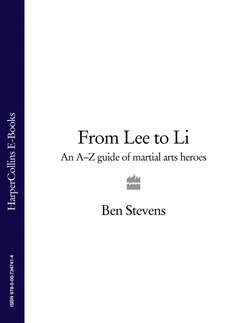Читать книгу From Lee to Li: An A–Z guide of martial arts heroes - Ben Stevens - Страница 17
CHAN, JACKIE
ОглавлениеBorn in Hong Kong on 7 April, 1954, Jackie’s parents christened him Chan Kong-sang, meaning ‘born in Hong Kong’. (Just in case there should have been any confusion over the matter, presumably.)
Almost as soon as he could walk, Chan was practising kung-fu with his father each morning, which it was hoped would help to instill such noble attributes as honesty, courage, and perseverance into the young boy.
When Chan was seven years old, his father was offered a job as a cook in the American Embassy in Australia. So off he and his wife went, leaving young Jackie in the tender loving care of the Peking Opera School.
Actually, there was nothing very tender or loving about the school. The child students there were drilled relentlessly in the martial arts, singing, acting, and acrobatics—all skills they would need for their intended life with the Peking Opera. The children were expected to learn quickly—and learn quickly they did; that is, if they wished to avoid being beaten and otherwise reprimanded in no uncertain terms.
Chan made his acting debut, aged eight, in the snappily entitled Seven Little Valiant Fighters: Big and Little Wong Tin Bar, and as he got a little older, found work as an extra in various other, long-forgotten films. He graduated from the Academy aged seventeen, only to discover that the Peking Opera would now not be requiring his services after all—it was no longer very popular, and was thus in the middle of firing rather than hiring.
Further limiting Chan’s employment opportunities was the fact that he could neither read nor write—two skills the Academy had apparently neglected to teach their students as they jumped through suspended hoops while singing operatic airs.
Desperate, Chan decided to become a stuntman, quickly earning a reputation for his almost suicidal lack of fear. Even seasoned professionals shied away from some of the stunts Chan was prepared to entertain, although to Chan it all came down to one simple choice: do the job and eat, or walk away and starve.
For a while he was doing reasonably well (he made a blink-and-you’ll-miss-it appearance in Bruce Lee’s Enter the Dragon), until the Hong Kong film industry started to do badly, and then even Chan had trouble finding work.
Running out of money, Chan was obliged to move to Australia to be with his parents. By all accounts he hated his time there, doing nothing more than menial construction jobs, although something came out of it that boded well for the future. One of Chan’s co-workers, who was having trouble pronouncing his full name, took to calling him just ‘Jackie’ instead
Then, pretty much out of the blue, Chan was contacted by one Willie Chan, who was working within the newly revitalised Hong Kong film industry.
‘I’ve been watching some of your stunts, and every one’s fantastic,’ said Willie. ‘How would you like to come back to Hong Kong and star in a film called New Fist of Fury?’
‘I’m on the plane already,’ replied the 21-year-old Jackie, tired and filthy after yet another day spent working as a casual labourer.
New Fist of Fury was followed by a number of other films starring Chan, but it was only when he began to put his own ideas into the plots that he became a genuine star; producing such gems as Drunken Master in 1978.
Popular as he may have been in Asia—and Hong Kong in particular (where his nickname continues to be ‘Big Brother’)—success in the West would elude Chan for a long time. Only with 1996’s Rumble in the Bronx did Chan become a notable box-office success, capitalising on this with later films such as Rush Hour and Shanghai Noon.
It’s well known that Chan has broken umpteen bones, including his neck, while performing his own stunts; and he even came close to death on one occasion when he fractured his skull while filming 1987’s Armour of God. As a result of this he suffers from chronic pain, and these days relies—though not always—upon stunt doubles, as it would otherwise be next to impossible to find an insurance company prepared to underwrite his productions.
He has in recent years sought to diversify from roles which feature his martial arts’ prowess (as well as his standard, ‘slightly-goofy-but-basically-a-nice-guy’ character), resulting in films including The Myth—in which he played both a general in ancient China as well as a modern-day archaeologist—and Rob-B-Hood, in which Chan played a ‘comical’ criminal who kidnaps a baby.
Since the mid-1980s, Chan has forged a separate career as a pop star, singing in a variety of languages (including English and Japanese) and releasing over 20 albums. He also works tirelessly for a number of charities, including those that deal with environmental issues and animal rights, and has paid for several schools to be built in the poorer areas of China.
